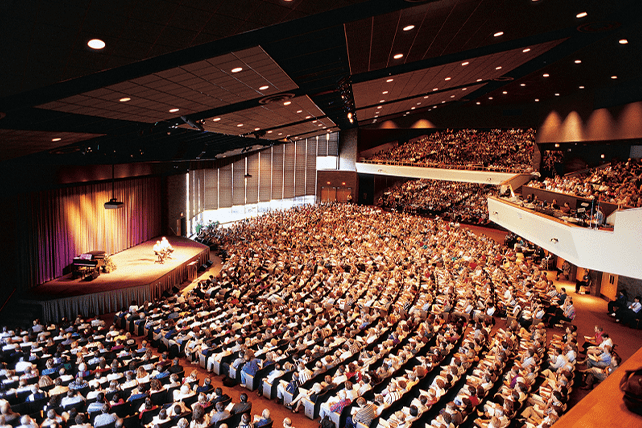SOUTH BARRINGTON, Ill. (RNS) — In the summer of 1992, a reporter made a pilgrimage to the Chicago suburbs to get a firsthand look at Willow Creek Community Church, a congregation rumored to be the future of American religion.
What he found was worshippers swaying to a rock band, a humorous skit with a spiritual message, a sermon about how God could make their lives better — a service that bore more than a passing resemblance to an episode of “Saturday Night Live,” which debuted the night before Willow Creek opened in the fall of 1975.
The story in the Chicago Reader by Robert McClory, himself a former priest, ran under the headline “We have seen the future of religion. And it is slick” — and asked, “Is this religion for the 21st century, or just the latest in religious gimmickry? Perhaps it’s a little bit of both.”
In fact, nearly everything McClory saw would be completely unremarkable to many churchgoers today. Willow Creek, which turns 50 this week, became a new model of American religion, which replaced tall steepled churches, stained glass, hymns and robed clergy with pastors in jeans backed by chart-topping bands, video screens and smoke machines, a worship style that has been summed up as a Coldplay concert followed by a TED Talk.
At its peak, Willow Creek’s model drew more than 25,000 worshippers each weekend and armies of volunteers, who sought to love God and save the world. All of it was overseen by a former youth pastor named Bill Hybels, the son of a wholesale produce salesman, who had a knack for marketing and way with Scripture, and his army of followers.

Greeters welcome congregants for a service at Willow Creek Community Church on Sept. 7, 2025, in South Barrington, Ill. (RNS photo/Carlos Javier Ortiz)
But just as familiar to today’s Christians was Willow Creek’s unraveling, with accusations of sexual misconduct in 2018 followed by denials, then a rash of resignations, and plummeting donations. Five years after the church celebrated its 40th anniversary in a packed-out United Center in Chicago, Willow Creek went into a COVID-19-aided financial and attendance tailspin that raised serious questions about its survival.
By then, Hybels was long gone, having resigned while still denying the accusations against him. A task force of evangelical leaders late concluded in 2019 that the accusations against him were credible.
The scandal and the COVID-19 pandemic left the church with years of struggle and an uncertain future.
On Saturday and Sunday (Oct. 11-12), the church will gather to celebrate 50 years of ministry, with a new pastor in place, attendance on the rebound after years of decline, and signs of hope for the years to come.
It’s been quite a journey from the church’s humble beginnings in a struggling suburban movie house.
In October 1975, at the Willow Creek Theater in Palatine, Illinois, a handful of volunteers, most of them barely out of high school, showed up early on a Sunday morning to sweep up popcorn and get the place ready for services.

FILE – Willow Creek Community Church worships together at the Willow Creek Theater in Palatine, Ill., in the 1970s. (Photo courtesy of Willow Creek Community Church)
Not long before, religion sociologists Don Miller and Wade Clark Roof had started to describe Americans as a generation of seekers — which made Willow’s seeker-friendly approach to ministry appealing.
“All of that just hit at the right time,” said Scott Thumma, director of the Hartford Institute for Religion Research and an expert on megachurches.
Nancy Beach, a former teaching pastor at Willow, has mixed emotions about the church’s early days. She was there at the beginning, having first met Hybels while a high school student at South Park Church in Park Ridge, Illinois, where Hybels started his ministry as a youth pastor.

